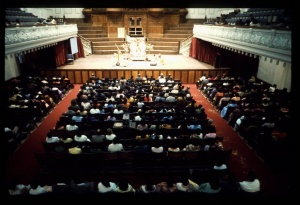SB 7.5.9: Difference between revisions
m (1 revision(s)) |
(Vanibot #0054 edit - transform synonyms into clickable links, which search similar occurrences) |
||
| (One intermediate revision by one other user not shown) | |||
| Line 1: | Line 1: | ||
{{info | {{info | ||
|speaker= | |speaker=Ṣaṇḍa and Amarka | ||
|listener= | |listener=Prahlāda Mahārāja | ||
}} | }} | ||
[[Category:Srimad-Bhagavatam - Canto 07 Chapter 05|s09 ]] | |||
[[Category:Bhagavatam Verses Spoken by Sanda and Amarka - Vanisource|070509]] | |||
<div style="float:left">'''[[Srimad-Bhagavatam]] - [[SB 7|Seventh Canto]] - [[SB 7.5: Prahlada Maharaja, the Saintly Son of Hiranyakasipu|Chapter 5: Prahlāda Mahārāja, the Saintly Son of Hiraṇyakaśipu]]'''</div> | |||
<div style="float:right">[[File:Go-previous.png|link=SB 7.5.8]] '''[[SB 7.5.8]] - [[SB 7.5.10]]''' [[File:Go-next.png|link=SB 7.5.10]]</div> | |||
{{RandomImage}} | |||
==== TEXT 9 ==== | ==== TEXT 9 ==== | ||
<div | <div class="verse"> | ||
vatsa prahrāda bhadraṁ te | :vatsa prahrāda bhadraṁ te | ||
satyaṁ kathaya mā mṛṣā | :satyaṁ kathaya mā mṛṣā | ||
bālān ati kutas tubhyam | :bālān ati kutas tubhyam | ||
eṣa buddhi-viparyayaḥ | :eṣa buddhi-viparyayaḥ | ||
</div> | </div> | ||
| Line 17: | Line 22: | ||
==== SYNONYMS ==== | ==== SYNONYMS ==== | ||
<div | <div class="synonyms"> | ||
''[//vanipedia.org/wiki/Special:VaniSearch?s=vatsa&tab=syno_o&ds=1 vatsa]'' — O dear son; ''[//vanipedia.org/wiki/Special:VaniSearch?s=prahrāda&tab=syno_o&ds=1 prahrāda]'' — Prahlāda; ''[//vanipedia.org/wiki/Special:VaniSearch?s=bhadram&tab=syno_o&ds=1 bhadram] [//vanipedia.org/wiki/Special:VaniSearch?s=te&tab=syno_o&ds=1 te]'' — all blessings and good fortune unto you; ''[//vanipedia.org/wiki/Special:VaniSearch?s=satyam&tab=syno_o&ds=1 satyam]'' — the truth; ''[//vanipedia.org/wiki/Special:VaniSearch?s=kathaya&tab=syno_o&ds=1 kathaya]'' — speak; ''[//vanipedia.org/wiki/Special:VaniSearch?s=mā&tab=syno_o&ds=1 mā]'' — do not; ''[//vanipedia.org/wiki/Special:VaniSearch?s=mṛṣā&tab=syno_o&ds=1 mṛṣā]'' — a lie; ''[//vanipedia.org/wiki/Special:VaniSearch?s=bālān&tab=syno_o&ds=1 bālān] [//vanipedia.org/wiki/Special:VaniSearch?s=ati&tab=syno_o&ds=1 ati]'' — passing over the other demon boys; ''[//vanipedia.org/wiki/Special:VaniSearch?s=kutaḥ&tab=syno_o&ds=1 kutaḥ]'' — from where; ''[//vanipedia.org/wiki/Special:VaniSearch?s=tubhyam&tab=syno_o&ds=1 tubhyam]'' — unto you; ''[//vanipedia.org/wiki/Special:VaniSearch?s=eṣaḥ&tab=syno_o&ds=1 eṣaḥ]'' — this; ''[//vanipedia.org/wiki/Special:VaniSearch?s=buddhi&tab=syno_o&ds=1 buddhi]'' — of the intelligence; ''[//vanipedia.org/wiki/Special:VaniSearch?s=viparyayaḥ&tab=syno_o&ds=1 viparyayaḥ]'' — pollution. | |||
</div> | </div> | ||
| Line 24: | Line 29: | ||
==== TRANSLATION ==== | ==== TRANSLATION ==== | ||
<div | <div class="translation"> | ||
Dear son Prahlāda, all peace and good fortune unto you. Kindly do not speak lies; just reply with the truth. These boys you see are not like you, for they do not speak in a deviant way. How have you learned these instructions? How has your intelligence been spoiled in this way? | Dear son Prahlāda, all peace and good fortune unto you. Kindly do not speak lies; just reply with the truth. These boys you see are not like you, for they do not speak in a deviant way. How have you learned these instructions? How has your intelligence been spoiled in this way? | ||
</div> | </div> | ||
| Line 31: | Line 36: | ||
==== PURPORT ==== | ==== PURPORT ==== | ||
<div | <div class="purport"> | ||
Prahlāda Mahārāja was still a boy, and therefore his teachers thought that if they pacified the little boy he would immediately speak the truth, revealing the secret of how the Vaiṣṇavas came there to teach him lessons in devotional service. It was surprising, of course, that in the same school the other boys of the Daityas were not polluted; only Prahlāda Mahārāja was supposedly polluted by the instructions of the Vaiṣṇavas. The main duty of the teachers was to inquire who those Vaiṣṇavas were that came to teach Prahlāda and spoil his intelligence. | Prahlāda Mahārāja was still a boy, and therefore his teachers thought that if they pacified the little boy he would immediately speak the truth, revealing the secret of how the Vaiṣṇavas came there to teach him lessons in devotional service. It was surprising, of course, that in the same school the other boys of the Daityas were not polluted; only Prahlāda Mahārāja was supposedly polluted by the instructions of the Vaiṣṇavas. The main duty of the teachers was to inquire who those Vaiṣṇavas were that came to teach Prahlāda and spoil his intelligence. | ||
</div> | </div> | ||
__NOTOC__ | |||
<div style="float:right; clear:both;">[[File:Go-previous.png|link=SB 7.5.8]] '''[[SB 7.5.8]] - [[SB 7.5.10]]''' [[File:Go-next.png|link=SB 7.5.10]]</div> | |||
__NOTOC__ | |||
__NOEDITSECTION__ | |||
Latest revision as of 23:04, 18 February 2024

A.C. Bhaktivedanta Swami Prabhupada
TEXT 9
- vatsa prahrāda bhadraṁ te
- satyaṁ kathaya mā mṛṣā
- bālān ati kutas tubhyam
- eṣa buddhi-viparyayaḥ
SYNONYMS
vatsa — O dear son; prahrāda — Prahlāda; bhadram te — all blessings and good fortune unto you; satyam — the truth; kathaya — speak; mā — do not; mṛṣā — a lie; bālān ati — passing over the other demon boys; kutaḥ — from where; tubhyam — unto you; eṣaḥ — this; buddhi — of the intelligence; viparyayaḥ — pollution.
TRANSLATION
Dear son Prahlāda, all peace and good fortune unto you. Kindly do not speak lies; just reply with the truth. These boys you see are not like you, for they do not speak in a deviant way. How have you learned these instructions? How has your intelligence been spoiled in this way?
PURPORT
Prahlāda Mahārāja was still a boy, and therefore his teachers thought that if they pacified the little boy he would immediately speak the truth, revealing the secret of how the Vaiṣṇavas came there to teach him lessons in devotional service. It was surprising, of course, that in the same school the other boys of the Daityas were not polluted; only Prahlāda Mahārāja was supposedly polluted by the instructions of the Vaiṣṇavas. The main duty of the teachers was to inquire who those Vaiṣṇavas were that came to teach Prahlāda and spoil his intelligence.